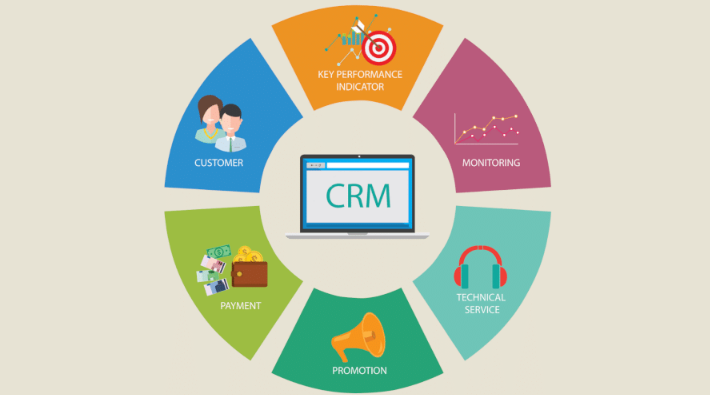How CRM Helps in Managing Customer Data In today’s fast-paced business environment, managing customer data effectively is crucial for any company looking to thrive. This is where Customer Relationship Management (CRM) systems come into play. CRM systems are designed to streamline the process of managing customer information, making it easier for businesses to provide personalized services, enhance customer satisfaction, and ultimately drive growth.
Understanding CRM Systems
What is a CRM?
A Customer Relationship Management (CRM) system is a technology that helps businesses manage their interactions with current and potential customers. It centralizes customer information, enabling businesses to build stronger relationships and improve customer retention.
Key Features of a CRM System
- Contact Management: Stores customer contact information.
- Sales Management: Tracks sales interactions and manages the sales pipeline.
- Marketing Automation: Automates marketing tasks and tracks campaign performance.
- Customer Service: Manages customer support and service requests.
- Analytics: Provides insights through data analysis and reporting.
The Importance of Customer Data

Types of Customer Data
Customer data can be categorized into several types:
- Demographic Data: Information such as age, gender, and occupation.
- Behavioral Data: Data on customer behavior, such as purchase history and website interactions.
- Psychographic Data: Insights into customer interests, values, and lifestyles.
- Transactional Data: Details of customer transactions, including purchase amounts and dates.
Why Customer Data is Crucial for Businesses
Customer data is essential for understanding customer needs and preferences, which allows businesses to tailor their products and services accordingly. It also helps in predicting future trends and making informed business decisions.
How CRM Collects Customer Data
Data Collection Methods
CRM systems collect customer data through various methods:
- Web Forms: Gathering data from online forms filled out by customers.
- Social Media: Extracting data from social media interactions.
- Email Campaigns: Collecting data from email interactions.
- Point of Sale Systems: Gathering data from in-store transactions.
Integrations with Other Systems
CRM systems often integrate with other business systems, such as e-commerce platforms, accounting software, and marketing tools, to collect comprehensive customer data seamlessly.
Organizing Customer Data with CRM
Data Structuring
CRM systems structure customer data in an organized manner, making it easy to access and analyze. This includes creating profiles for each customer and categorizing data by types.
Categorizing and Tagging Data
By categorizing and tagging data, businesses can quickly find specific information and segment customers based on various criteria, such as purchase history or location.
Analyzing Customer Data
CRM Analytics Tools
CRM systems come equipped with powerful analytics tools that help businesses make sense of their customer data. These tools can generate reports, visualize trends, and provide actionable insights.
Benefits of Data Analysis
Analyzing customer data helps businesses identify opportunities for improvement, understand customer behavior, and make data-driven decisions that enhance customer satisfaction and loyalty.
Using CRM for Customer Segmentation
What is Customer Segmentation?
Customer segmentation is the process of dividing customers into distinct groups based on specific criteria, such as demographics or buying behavior.
How CRM Helps in Segmentation
CRM systems facilitate customer segmentation by providing the tools to analyze and categorize customer data effectively. This enables businesses to tailor their marketing strategies and improve customer targeting.
Personalizing Customer Interactions
Personalization Strategies
Personalization involves customizing interactions and offerings to meet the individual needs of customers. This can include personalized emails, product recommendations, and tailored marketing messages.
CRM’s Role in Personalization
CRM systems play a crucial role in personalization by storing detailed customer information and tracking interactions, allowing businesses to deliver personalized experiences consistently.
Improving Customer Service
CRM and Customer Support
CRM systems enhance customer support by providing a centralized database of customer information, making it easier for support teams to resolve issues quickly and efficiently.
Enhancing Customer Experience
By using CRM systems, businesses can offer a seamless customer experience across all touchpoints, from initial contact to post-purchase support.
Automating Customer Management Tasks
Automation Features in CRM
CRM systems come with automation features that streamline various customer management tasks, such as sending follow-up emails, scheduling appointments, and generating invoices.
Examples of Automated Tasks
- Email Marketing: Automatically sending targeted emails based on customer behavior.
- Lead Scoring: Automatically ranking leads based on their likelihood to convert.
- Customer Onboarding: Automating the process of welcoming new customers and providing them with necessary information.
CRM and Sales Management
Tracking Sales Activities
CRM systems track all sales activities, from initial contact to closing the deal, providing a clear view of the sales pipeline and helping sales teams stay organized.
Sales Forecasting
Using historical data, CRM systems can generate sales forecasts, helping businesses predict future sales and plan accordingly.
Marketing Campaign Management with CRM
CRM in Planning Marketing Campaigns
CRM systems assist in planning marketing campaigns by providing insights into customer behavior and preferences, enabling businesses to create targeted and effective campaigns.
Measuring Campaign Effectiveness
CRM systems track the performance of marketing campaigns, allowing businesses to measure their effectiveness and make adjustments as needed.
Data Security and Privacy in CRM
Ensuring Data Security
CRM systems prioritize data security by implementing robust security measures, such as encryption and access controls, to protect customer information.
Compliance with Privacy Regulations
CRM systems help businesses comply with privacy regulations, such as GDPR and CCPA, by ensuring that customer data is handled in accordance with legal requirements.
Choosing the Right CRM for Your Business
Factors to Consider
When choosing a CRM system, businesses should consider factors such as ease of use, customization options, integration capabilities, and cost.
Popular CRM Solutions
Some popular CRM solutions include Salesforce, HubSpot, Zoho CRM, and Microsoft Dynamics 365, each offering unique features to meet different business needs.
Conclusion
CRM systems are invaluable tools for managing customer data, providing businesses with the insights and capabilities needed to build strong customer relationships, improve service, and drive growth. By leveraging the power of CRM, businesses can organize, analyze, and utilize customer data effectively, ensuring they stay ahead in today’s competitive market.